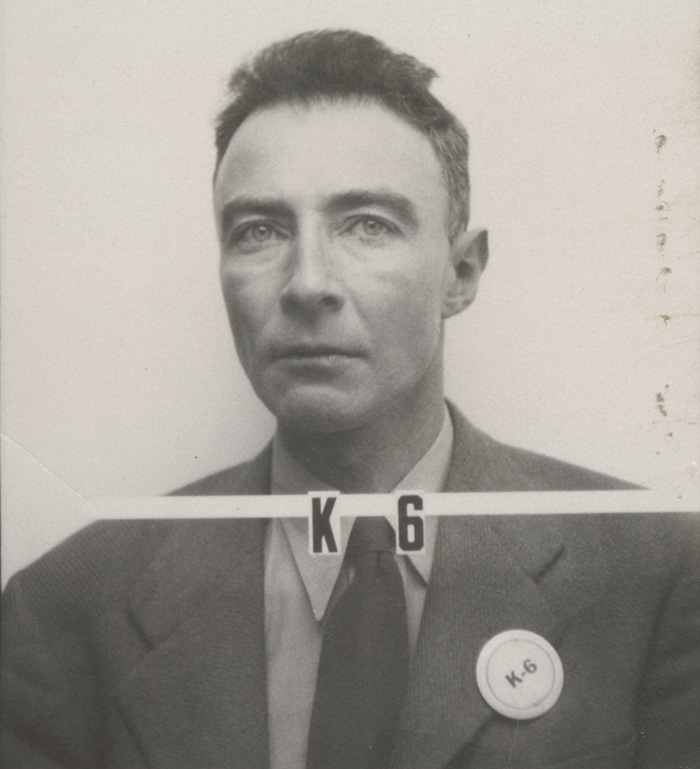
J. Robert Oppenheimer’s ID badge from the Los Alamos Laboratory\
J. Robert Oppenheimer was a pivotal figure in the Manhattan Project that developed the first nuclear weapons during World War II. Often called the “father of the atomic bomb,” Oppenheimer oversaw the creation of the bombs that would devastate Hiroshima and Nagasaki in 1945. However, he later became an outspoken critic of nuclear weapons, warning of the dangers of this terrifying technology he helped unleash.
Brilliant Physicist
Julius Robert Oppenheimer was born in New York City in 1904 to an affluent Jewish family. Showing precocious talents in science from a young age, he studied physics in the 1920s and 1930s in Germany and the United States. Oppenheimer became a professor at the University of California, Berkeley and made significant contributions to the field of quantum mechanics.
When World War II erupted, Oppenheimer was recruited to help the U.S. effort to beat the Nazis in developing an atomic bomb. He was chosen to lead the clandestine Manhattan Project in Los Alamos, New Mexico due to his brilliance and management skills. Oppenheimer assembled a team of the nation’s top scientists to work on the daunting and unprecedented task.
Father of the A-Bomb
Under intense pressure, Oppenheimer successfully oversaw the Manhattan Project from 1942 to 1945. This huge military-industrial endeavor required marshaling massive resources and intellect in pursuit of splitting the atom and unleashing its immense destructive power.
In July 1945, Oppenheimer witnessed the historic Trinity nuclear test in the New Mexico desert, where the first atomic explosion was achieved. He famously recalled a line from the Hindu scripture Bhagavad Gita: “Now I am become Death, the destroyer of worlds.” This accurately captured the terrifying gravity of what he had helped bring into being.
Just weeks later, Oppenheimer’s creations were dropped on the Japanese cities of Hiroshima and Nagasaki. The devastating explosions brought a swift end to World War II but killed over 200,000 people. Oppenheimer was initially hailed as a hero who helped the U.S. prevail, but unease was already setting in.
Opposing Further Use
In the aftermath of Hiroshima and Nagasaki, Oppenheimer staunchly opposed using atomic bombs again as the Cold War began. He supported international control of nuclear energy and weapons to avoid catastrophic escalation. However, his calls for restraint concerned officials who wanted to maintain nuclear supremacy over the Soviets.
As anti-Communist fervor grew in the late 1940s, Oppenheimer came under suspicion for his left-leaning views. In 1954, his security clearance was revoked over fabricated charges he was disloyal to the U.S. Unable to continue nuclear research, his stellar career was unjustly cut short during the Red Scare.
Legacy as the “Father of the A-Bomb”
Oppenheimer died in 1967 at age 62, with his reputation badly tarnished but his immense contributions recognized. He is remembered as the driving scientific force who unwillingly gave the world its most destructive invention. Yet he spent his final years warning of the threat of unconstrained nuclear weapons proliferation that he had been complicit in unleashing.
J. Robert Oppenheimer’s name will forever be linked to bringing the atomic bomb into existence. But his legacy is complicated, as he regretted the terrifying genie let out of the bottle. Oppenheimer serves both as a cautionary tale about the moral hazards of science in war and as an advocate for humanity exerting wisdom in wielding such powerful technologies. His life story provokes vital questions that resonate in the nuclear age he helped inaugurate.

Theodore Lee is the editor of Caveman Circus. He strives for self-improvement in all areas of his life, except his candy consumption, where he remains a champion gummy worm enthusiast. When not writing about mindfulness or living in integrity, you can find him hiding giant bags of sour patch kids under the bed.
